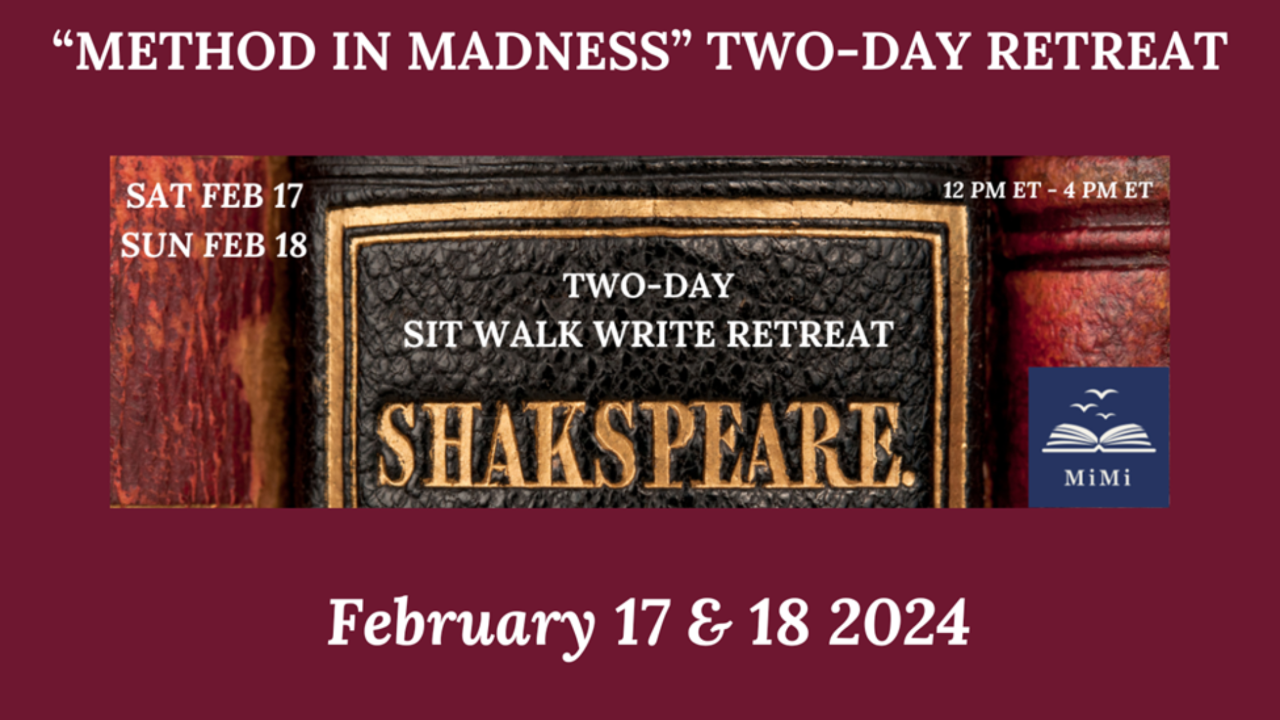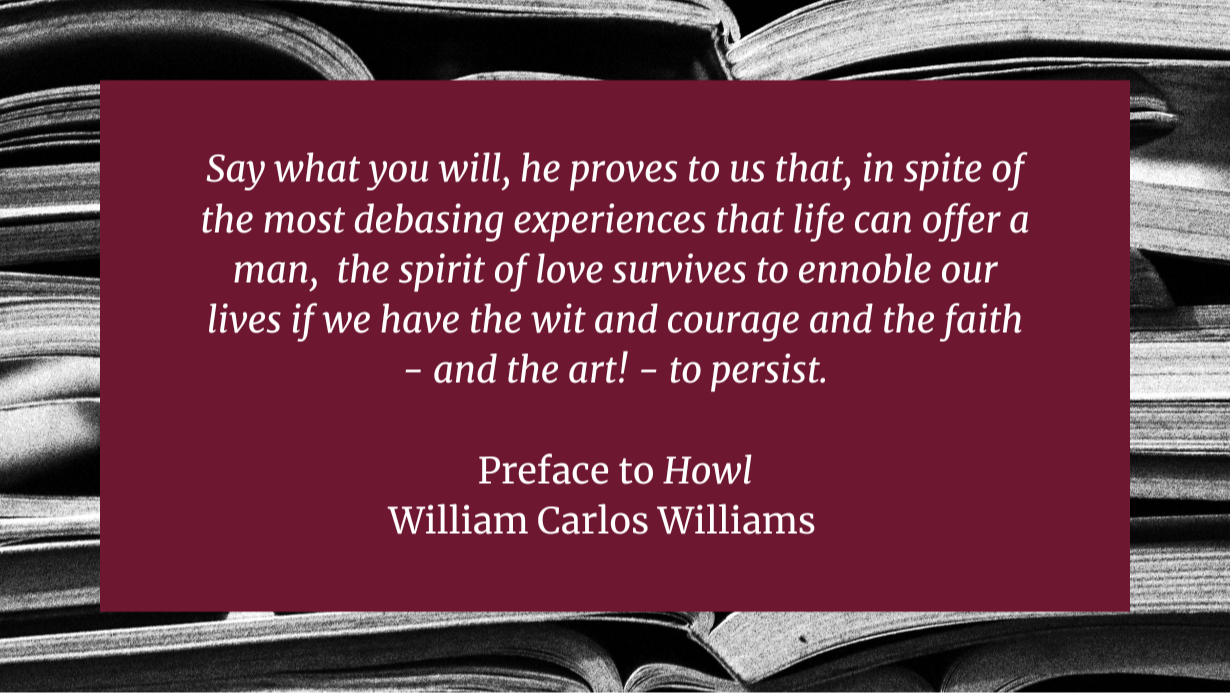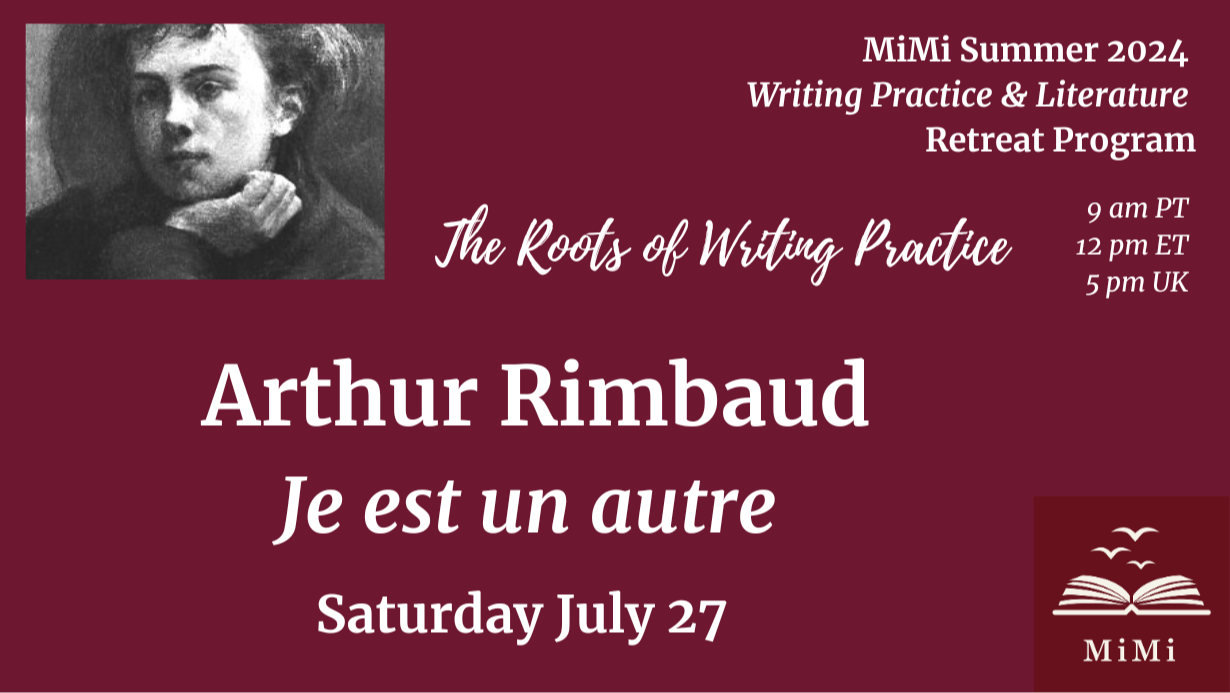The Method in Madness Institute
Writing Practice & Literature Events
A Study of the Mind

SUMMER 2024
The Roots of Writing Practice
Rimbaud, Kerouac, Ginsberg

Writing practice is one of the three pillars of The Method in Madness Institute and consists of using writing as a way to study the mind - a Zen way to study the mind.
Our seasonal monthly Sit Walk Write Retreats alternate between combining writing practice with either the study of a mindfulness text or the study of some of the greatest authors in the history of world literature.
This summer, we're very much looking forward to diving into the roots of writing practice from a literary point of view together!
In Writing Down the Bones, Natalie Goldberg proposes five "writing practice rules," which seem to come directly from Beat Generation writer Jack Kerouac's Essentials of Spontaneous Prose, where he summarized his writing method.
Kerouac himself wrote very early on, in his novel I Wish I Were You (a rewriting of the very first Beat work, And the Hippos Were Boiled in Their Tanks, written together with William Burroughs): "Rimbaud's prose is what I'd like to achieve."
And that was no coincidence. A copy of Rimbaud's A Season in Hell was already in Burroughs' library when Kerouac and Ginsberg first met him in the mid-1940s (when Henry Miller had just published his book about Rimbaud, in which he writes that the "parallels" between Rimbaud and himself are "endless").
Burroughs was soon called "a Rimbaud in a raincoat" by a fellow writer, and the poet would play a key role in Burroughs' "cut-up method" of writing.
Finally, when Allen Ginsberg's famous poem Howl came out, another key Beat Generation writer, Gregory Corse, sent him what Ginsberg described as "a short crazy letter - so sharp." It bluntly stated: "Read Howl and thought why when Rimbaud put us all down by 19ing himself. You are old. I am old." In other words: after Corse read Howl, he wondered why Ginsberg had written it, knowing what Rimbaud had already achieved...
And indeed, in 1945 already, Ginsberg wrote a long letter to his Columbia University professor Trilling "in defense of Rimbaud," passionately praising him as a "genius."
***
So who was Arthur Rimbaud? And why did he have such a tremendous influence on subsequent generations of writers, including the French surrealists (who invented "automatic writing") and then also the Beats ?
That's what we'll see during the first event of this summer, which will take place on Saturday, July 27.
We will read some of his most important poems, as well as passages from letters describing his writing process - and what he aimed to achieve, namely to deepen his discovery that "I is another" (in French: "Je est un autre") and explore the unknown through a "long derangement of the senses." In a 1975 class taught at Naropa University, Allen Ginsberg called it "the best essay on poetics in the 19th century."
On Sunday, August 18, we'll treat ourselves to listening to the unique voice of Jack Kerouac, accompanied by another huge influence on the Beat Generation: jazz music -more precisely, Charlie Parker. The event will include a close-reading of his Essentials of Spontaneous Prose and a comparison with "writing practice as a Zen practice."
Finally, the End of Summer event on Sunday September 15 proposes to further explore the way the Beat Generation eagerly studied Buddhist philosophy, practiced meditation, and put what they learned at the very heart of most of their writings. We'll do so by reading an essay by Allen Ginsberg in which he makes the "beating heart" of Buddhism inside his poetry palpable.
What You Will Discover
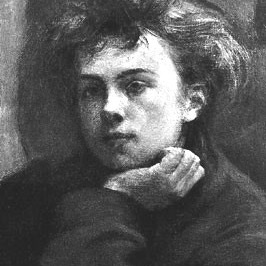
The link between the "go for the jugular" writing practice rule and Rimbaud's concept of the poet as a "thief of fire"
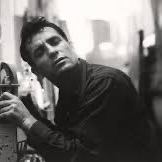
The differences and similarities between the writing practice rule "keep the hand moving" and Kerouac's method of "spontaneous prose"
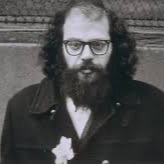
The origin of writing practice's "first thoughts" in Ginsberg's integration of meditation and poetry
Retreat Schedule
- Opening Meditation
- Introduction
- Writing Practice
- Breakout Rooms
- Beat Generation Reading
- Break
- Walking Meditation
- Writing Practice
- Breakout Rooms
- Discussion and Q&A
- Closing Meditation
Early Bird Registration is Now Open!
For a 20% discount sign up before Tuesday July 23 at 12 am PT
WHAT IS A "SIT WALK WRITE RETREAT"?
When stripped of its cultural expression, Buddhism is often presented as a "science of the mind." Traditionally, it proposes different ways of studying the mind and working with the causes of all suffering, including through sitting and walking meditation.
"Writing practice" is what Natalie Goldberg called the writing method described in Writing Down the Bones, a method that is simultaneously an authentic Zen practice.
MiMi Sit Walk Write Retreats combine guided meditations, writing practice, breakout rooms, and the study of texts explaining the Buddhist view on how the mind works and how to make it work for us rather than being tossed around by it.
The Program In Detail
A limited number of scholarships are available for those who may need them. To apply for a scholarship, click HERE.
The Roots of Writing Practice
Arthur Rimbaud
Je est un autre
Half-Day Sit Walk Write Retreat
Saturday July 27
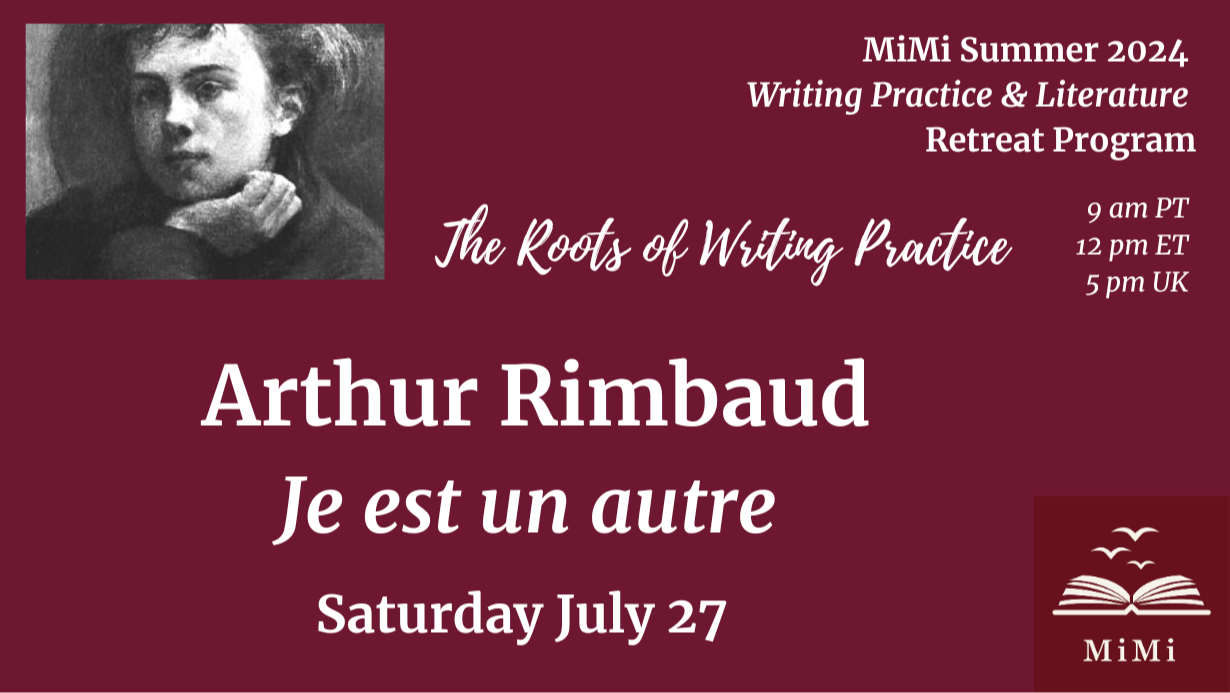
The first event of The Roots of Writing Practice Summer Program will focus on the poetics and poetry of "the man with soles of wind," as the great French poet Verlaine - who also happened to be his boyfriend - called Rimbaud. And being an eternal "vagrant" with a penchant for homosexuality and mind-expanding drugs is the least of what Rimbaud has in common with the Beat Generation...
- To sign up for the entire Summer Program, click HERE.
- To sign up for this event only, click HERE.
- To apply for a scholarship, click HERE.
The Roots of Writing Practice
Jack Kerouac
Spontaneous Prose
Half-Day Sit Walk Write Retreat
Sunday, August 18
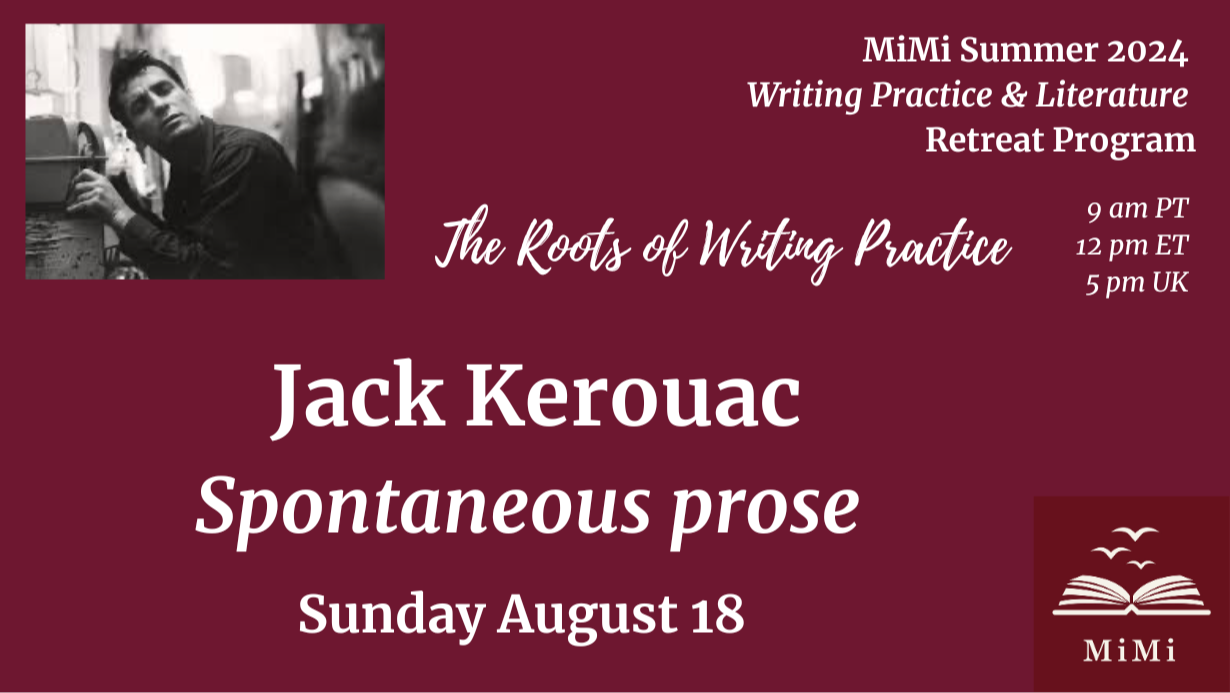
The term "beat" originated in a conversation Jack Kerouac had in the 1940s. Over time, it came to stand for defeated/downtrodden, the beatitude of the saved, and the beat of jazz.
During the second event of the season, we will see how the endless improvisation that characterized contemporary jazz and blues was a major inspiration for Kerouac's multiple ways in which his new writing method incorporated "spontaneity."
- To sign up for the entire Summer Program, click HERE.
- To sign up for this event only, click HERE.
- To apply for a scholarship, click HERE.
The Roots of Writing
Allen Ginsberg
Meditation & Poetry
Half-Day Sit Walk Write Retreat
Sunday, September 15

The third and last exploration of the Beat Generation and its link with writing practice as a Zen practice will show how Ginsberg's study of Zen and Tibetan Buddhism (Trungpa Rinpoche), together with Kerouac's mentorship as a writer, led them to adopt a writing style based on the realization that "all I have to do is write my mind down as it is. Just the natural mind has the sacramental imprint. The naked mind is the clearest."
Since this is also the last "The Roots of Writing Practice" Summer Retreat, it will be a 4-hour instead of 3.5-hour event.
- To sign up for the entire Summer Program, click HERE.
- To sign up for this event only, click HERE.
- To apply for a scholarship, click HERE.
About The Teacher
Anja Van Rompaey is a published author, philosopher, and certified Trauma-Sensitive meditation teacher (trained in teaching Jon Kabat-Zinn's MBSR, Mark William's Mindfulness, and Jack Kornfield and Tara Brach's Awareness meditation programs).
She led the Natalie Goldberg- style writing practice community EU Writing Down the Bones for more than four years and founded The Method in Madness Institute, a MindX SRL division dedicated to allowing everyone to learn how to meditate, read the classics in world literature, philosophize, and use writing practice as an authentic Zen "study of the mind" - or to deepen their practice.
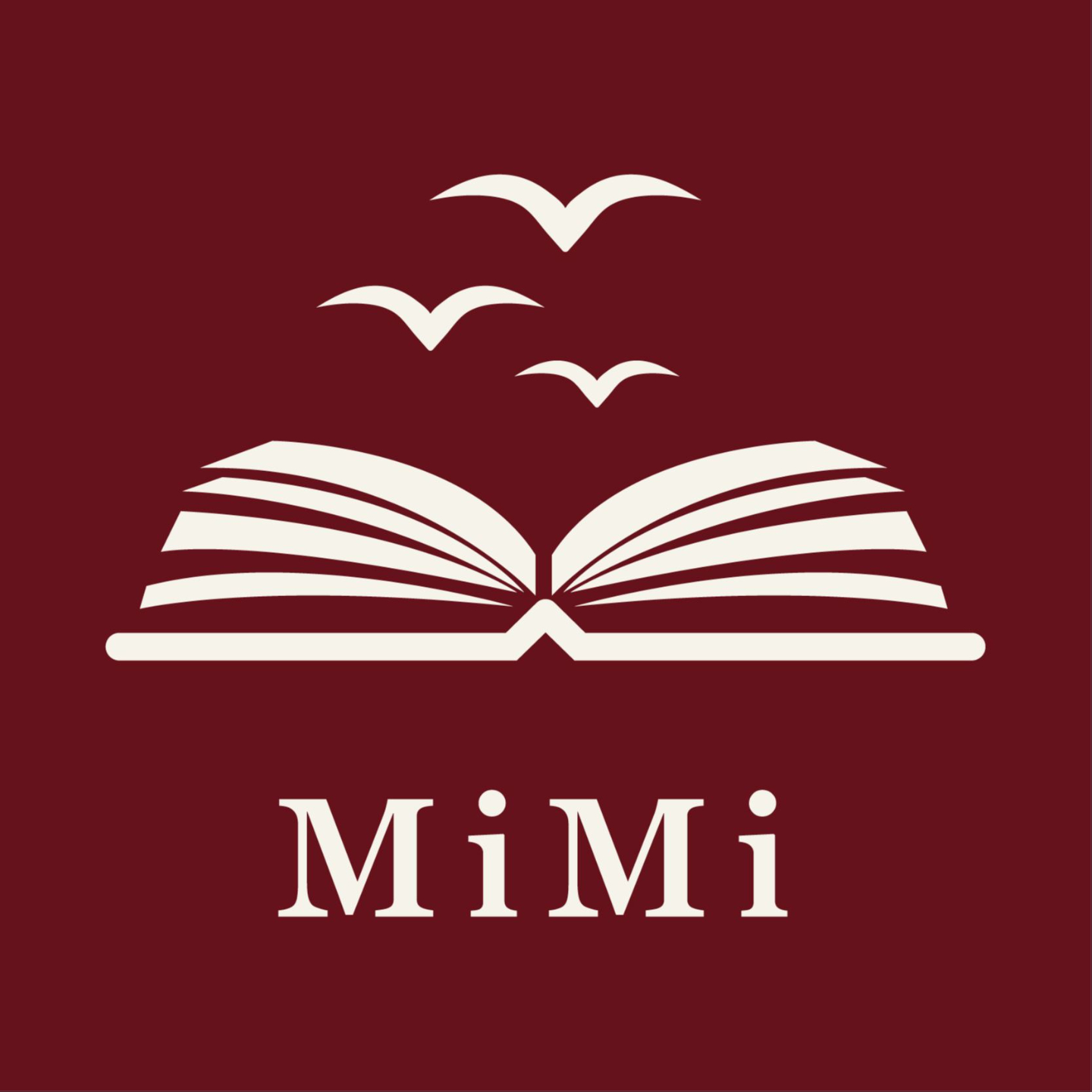
Anja teaches The Compassionate Writing Year program (including monthly Hemingway "Reading Down the Bones" retreats) as well as a weekly seminar on Suzuki Roshi's classic Zen Mind, Beginner's Mind. Passionate about writing, reading, mindfulness, and sharing her knowledge and expertise wherever possible, she has organized more than fifty Half-day and Full-day online Sit Walk Write retreats. She's currently a student of Mingyur Rinpoche, and speaks four languages (including French and English).
Sign Up for the Entire Season
Or Try Out a Single Event First
Combine all three events for the most transformational effect,
or feel free to sign up for only one event to see whether or not this is for you.
If you are a writer or meditator, however, learning more about the background of "writing practice as a Zen practice" by studying its literary roots can help you gain a clearer idea of how to use writing to study the mind, and how to let it inspire the fiction or non-fiction that you may be working on - or may one day be tempted to experiment with. Therefore, we strongly encourage you to use this opportunity to enroll in the entire season.
100% Money-Back Guarantee
We guarantee a full refund until 24 hours before the day of the event.
Early Bird tickets for the entire program are refundable until 24 hours before the first event.

Will there be breakout rooms to read my writing aloud?
Will the event be recorded?
What is the difference with Natalie Goldberg Sit Walk Write retreats, if any?
Are scholarships available?
The Beats & French Bohemia
This iconic picture perfectly illustrates the importance of French literature in the lives of Beat Generation authors.
It was taken in late 1957 in room 25 of the Beat Hotel in Paris (the only hotel ever named after them).
The image shows a smiling Ginsberg posing beneath a framed reproduction of a detail from Henri Fantin-Latour's painting Le coin de table, which represents Arthur Rimbaud.
It portrays Ginsberg's longstanding admiration for the poet as embodying the very ideal to which he himself aspired.
Rimbaud's picture partially conceals the reproduction of a painting by French painter Paul Cézanne.
In a letter explaining the aesthetics of Howl, Ginsberg mentioned "my master who is Cézanne" - yet another recurring influence on his work.
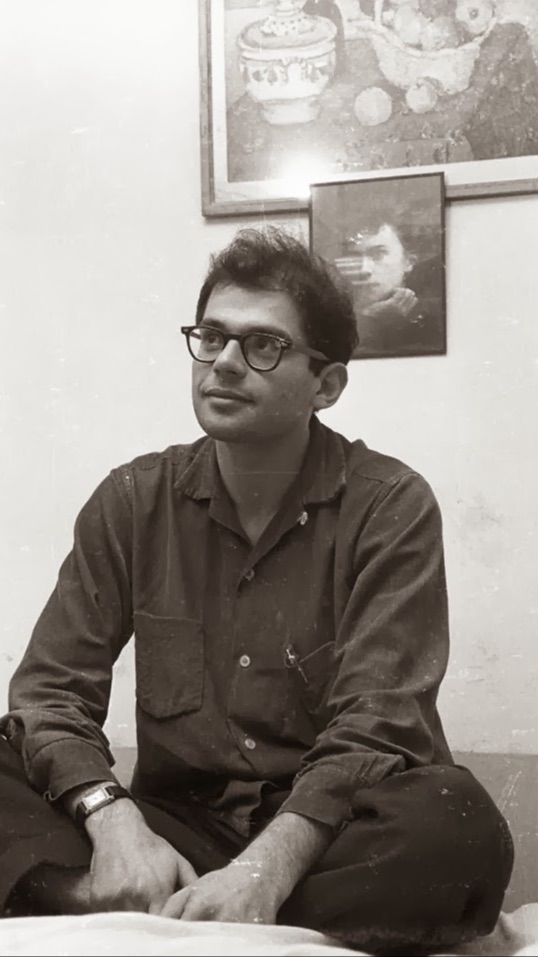
Support Us
Writing, literature, and meditation should be available to all, regardless of background or financial circumstances.
We're deeply grateful for any donation to the MiMi Scholarship Fund (one-time or recurring)
helping those who may need it to benefit from our educational services and community too.
Stay Connected
Subscribe to our newsletter to stay informed of all upcoming courses, writing retreats, literature workshops, and discounts.
When you hit the “send” button, you will receive a confirmation email. Please remember to click on the link to validate your MiMi newsletter subscription!


